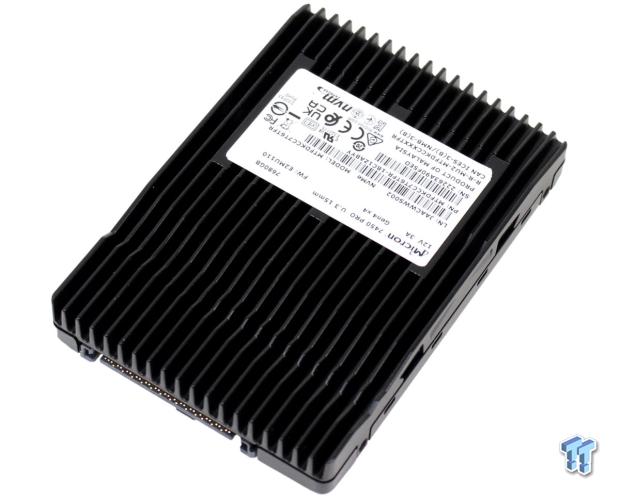
The Bottom Line
Pros
- + Superior QoS
- + PCIe Gen4
- + Capacity and form factor options
Cons
- - Low QD Seq. Read
Should you buy it?
AvoidConsiderShortlistBuyIntroduction and Drive Details
Micron's 176-Layer B47R 3-bit flash is, if we were to guess, currently the most prolific flash we see today in the consumer realm. This stuff is fast, endurant, and cost-effective, making it the ideal choice for leading purveyors of non-volatile storage like Kingston, Phison, InnoGrit, ADATA, and a whole host of others. Additionally, Micron's current flagship B47R flash offers a smaller footprint than competing solutions enabled by Micron's proprietary CMOS-under-array (CuA) technology.
The PCIe Gen4 SSD we have on our bench today, the 7450, builds on the success of its predecessor, the 7400 PCIe Gen4 offering. Like its predecessor, the 7450 Series offers the industry's most diverse range of PCIe Gen4 SSD form factors, including U.3, M.2, and E1.S, enabling a full spectrum of enterprise storage use cases, including boot, cache, and main data storage.
Micron's 7450 Series is also available in an impressive array of capacities, from 400GB to 15.36TB. Micron further asserts the 7450 Series is the only PCIe Gen4 U.3 SSD in the industry available in both 15mm and 7mm. These capacity and form factors choices help meet rapidly evolving power and thermal needs in the datacenter.
With the move from 96-Layer flash to double the density 176-Layer flash, we now have double the capacity within the same footprint. This is hugely significant as it relates to TCO (Total Cost of Ownership). Nothing is a more important factor to efficiency within the datacenter than density or physical footprint. If you can get double the amount of storage within the same footprint while keeping the same power envelope and factoring in faster, more secure processing, TCO is essentially 50% lower. This is exactly what Micron's 7450 Series is offering. As we see it, you really cannot afford not to implement an upgrade of this magnitude.
Micron's 7450 Pro Series is being launched alongside a write-intensive version designated as the 7450 MAX. This drive offers similar read performance but a whopping 86% higher 4K random write performance. Additionally, the MAX version is rated for three drive writes per day, whereas the Pro is rated for one drive write per day. As far as we can tell, the only difference between the Pro and MAX is over-provisioning, so it's likely one could just OP the Pro and get the same increased write performance and endurance results as the MAX. However, the warranty would be a problem though if exceeding 1 DWPD.
Specs/Comparison Products
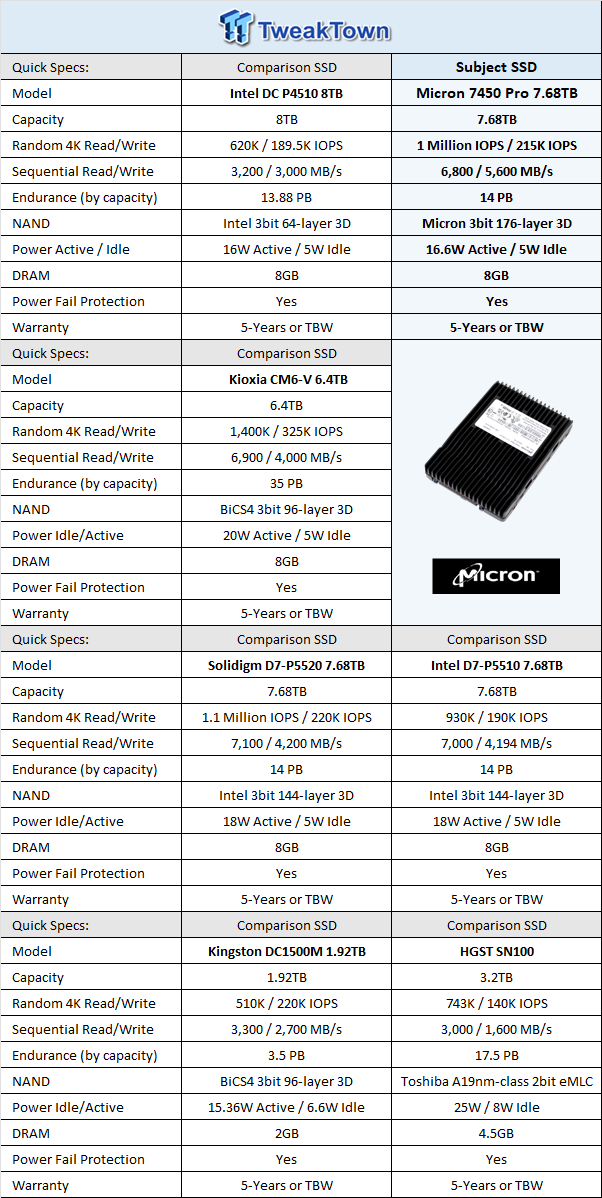
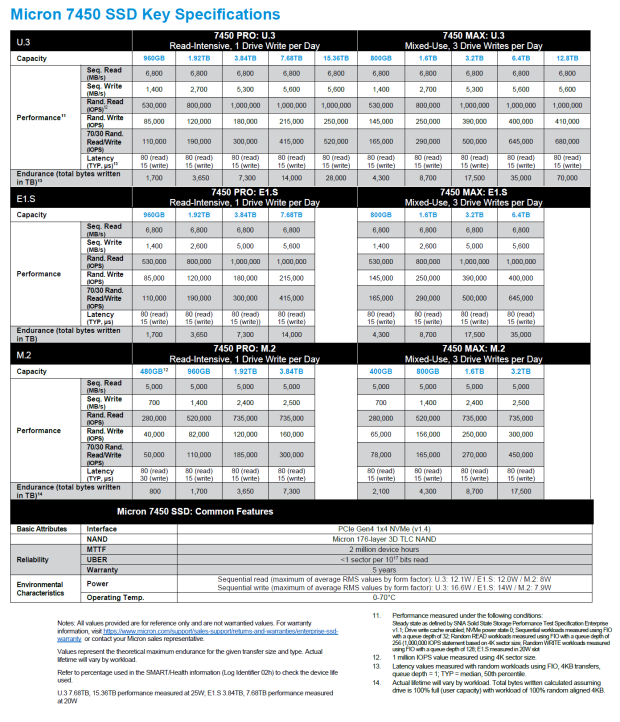
Micron 7450 Pro 7.68 TB NVMe PCIe Gen4 x4 U.3 SSD
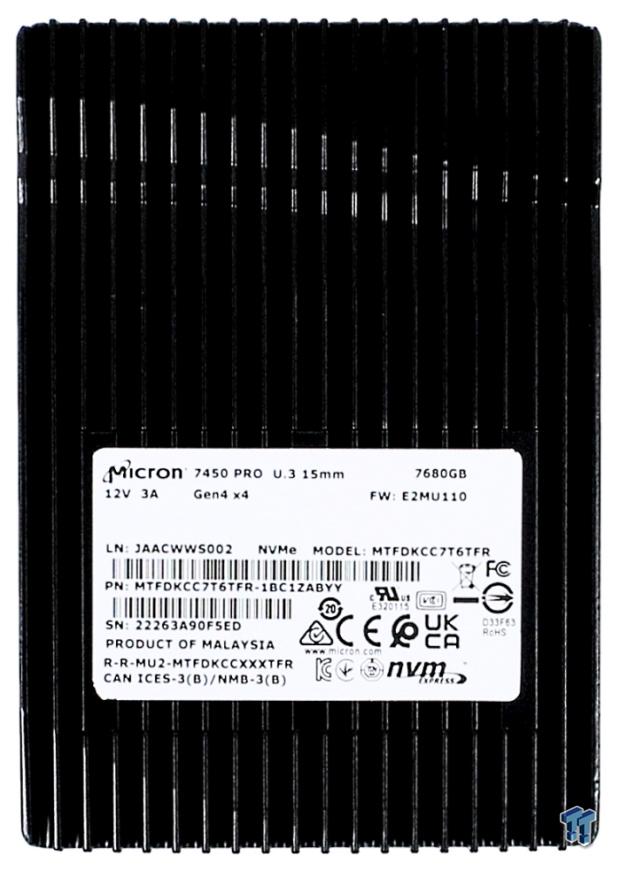
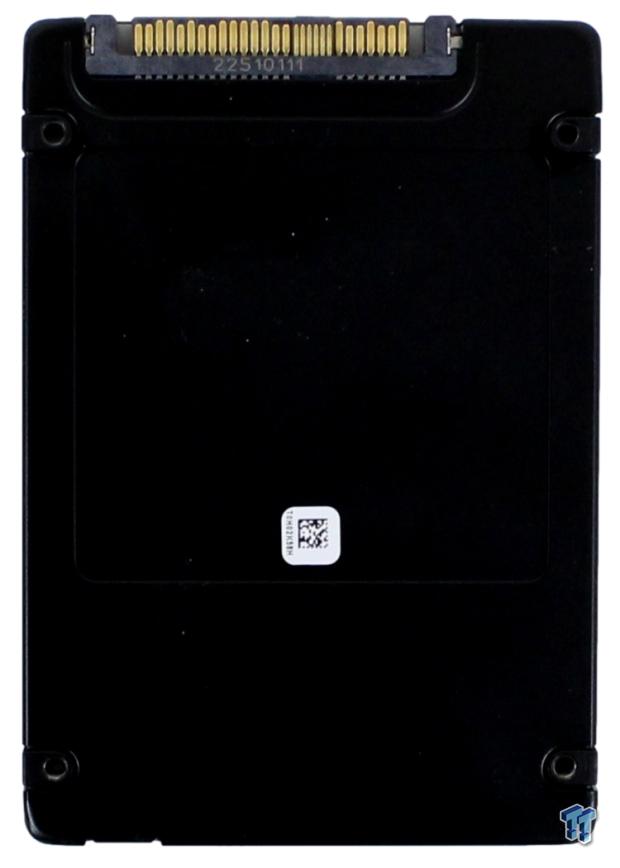
The top of the drive's enclosure is a deeply finned cast aluminum piece that serves as a heatsink.
Enterprise Testing Methodology
TweakTown strictly adheres to industry-accepted Enterprise Solid State Storage testing procedures. Each test we perform repeats the same sequence of the following four steps:
- Secure Erase SSD
- Write the entire capacity of SSD a minimum of 2x with 128KB sequential write data, seamlessly transition to the next step
- Precondition SSD at maximum QD measured (QD32 for SATA, QD256 for PCIe) with the test-specific workload for a sufficient amount of time to reach a constant steady-state, seamlessly transition to the next step
- Run test-specific workload for 5-minutes at each measured Queue Depth, and record results

Benchmarks - Random and Sequential Performance
4K Random Write/Read
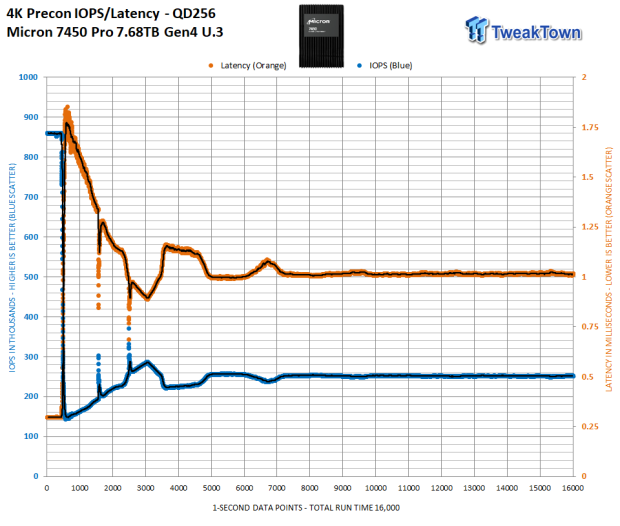
We precondition the drive for 16,000 seconds, receiving performance data every second. We plot this data to observe the test subject's descent into steady-state.
Steady-state is achieved at 8,000 seconds of preconditioning. The average steady-state write performance at QD256 is approximately 250K IOPS. The extremely tight pattern with virtually no outliers indicates high QoS. The pattern is so tight we had to change the scaling of our data points for the colors to show over the trendline. Impressive.
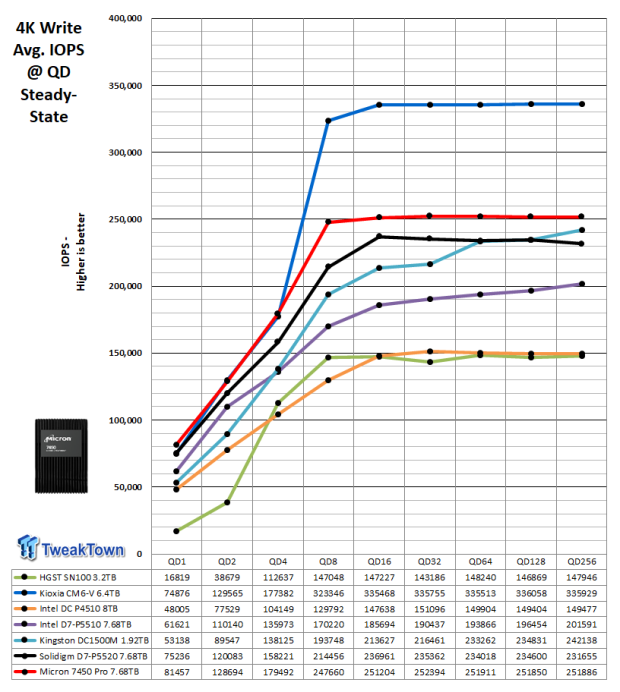
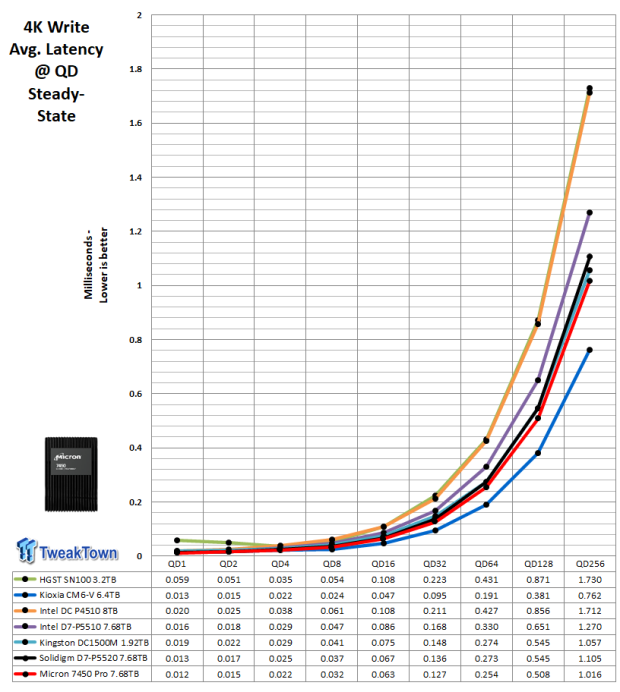
We are hitting a max of 252,000 4K random write IOPS which is 37K better than the stated sustained 4K random write spec. Faster, better QoS, and higher efficiency than any similarly overprovisioned SSD we've tested to date.
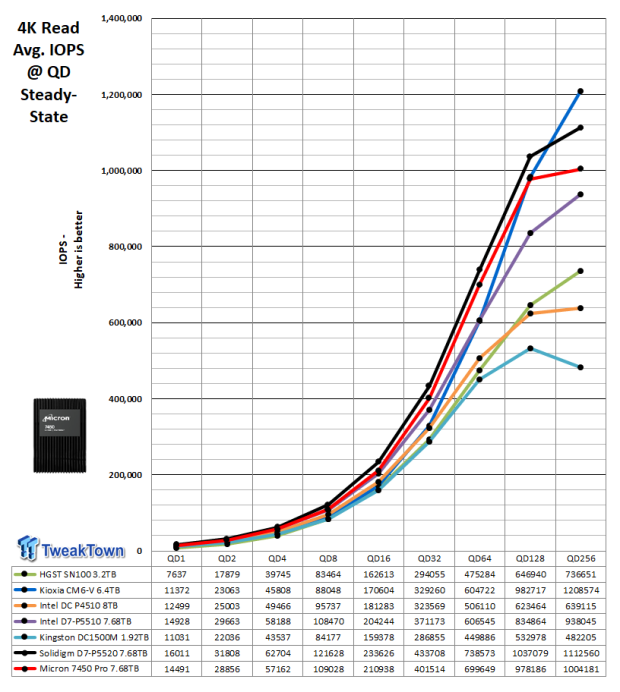
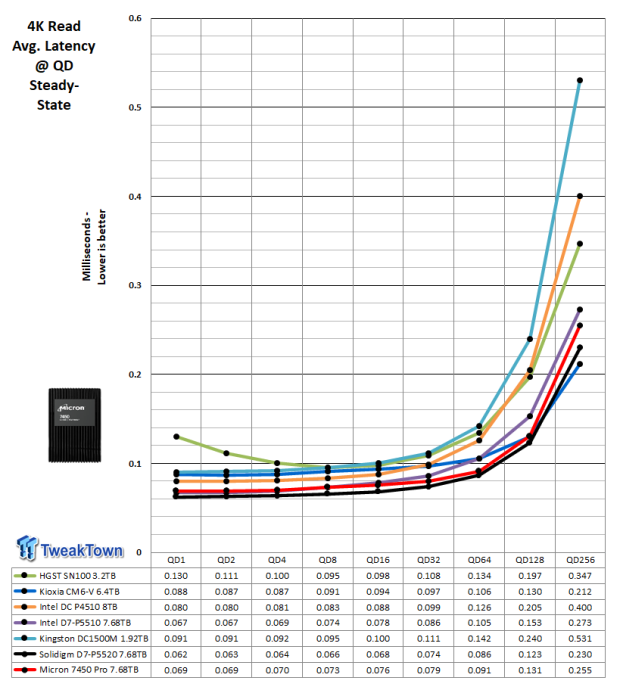
Random read performance is where performance matters most, most of the time, for the majority of use-case scenarios. Micron specs the 7.68TB 7450 Pro as capable of delivering up to 1 million IOPS here, which is exactly what we are seeing. Additionally, and even more noteworthy, our test subject is serving up the second-best performance curve here we've encountered to date.
8K Random Write/Read
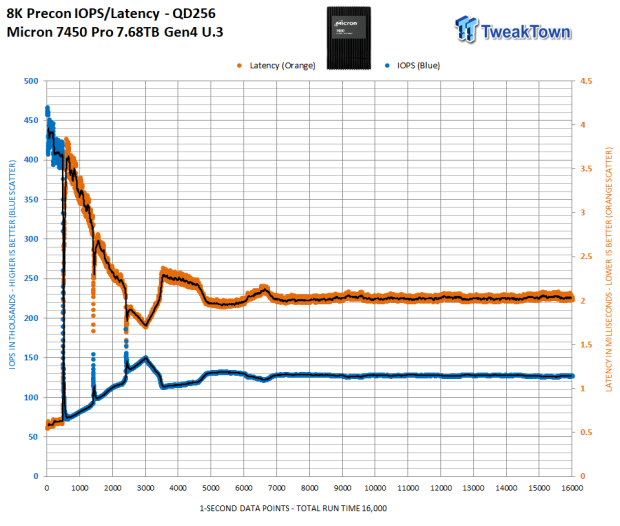
We precondition the drive for 16,000 seconds, receiving performance data every second. We plot this data to observe the test subject's descent into steady-state.
Steady-state is achieved at 8,000 seconds of preconditioning. The average steady-state write performance at QD256 is approximately 126K IOPS. Once again, the pattern is so tight (QoS is so good) that we had to change the scaling of our data points for the colors to show over the trendline. Impressive.
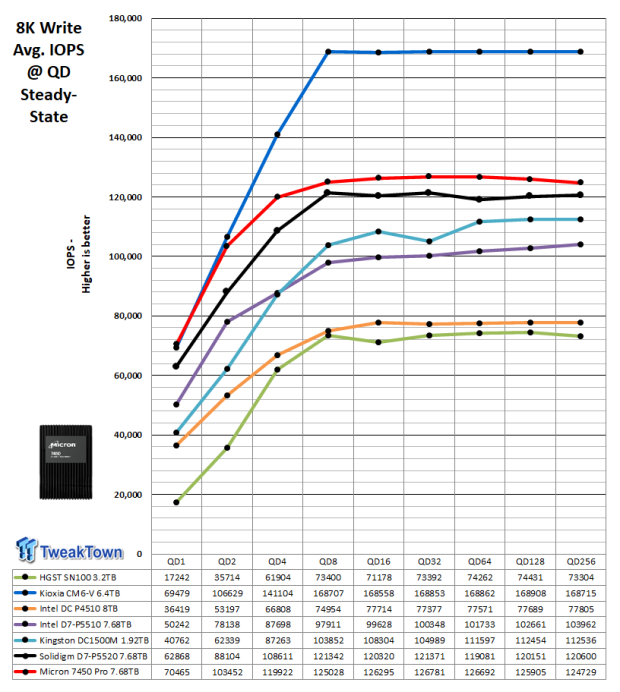
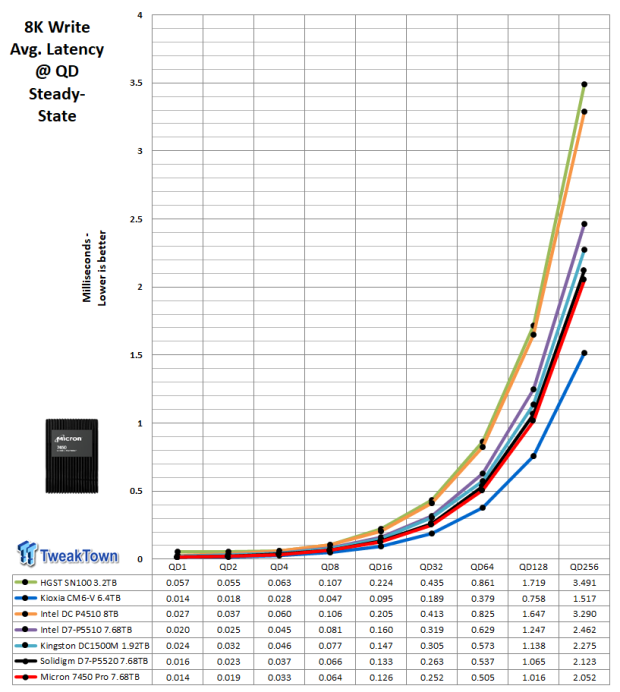
We expect 8K random to track exactly the same as 4K random, just at a lower rate. The 7450 Pro 7.68TB performs as expected, which is the best we've ever seen from a similarly overprovisioned flash-based SSD.
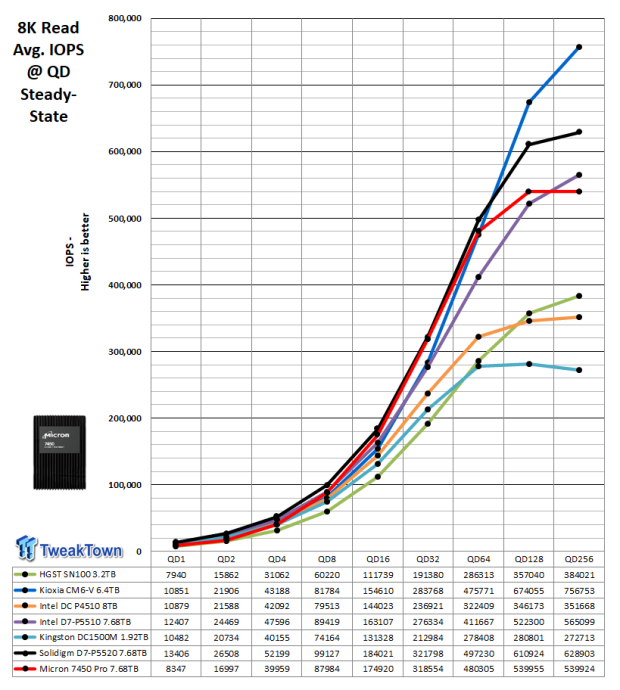
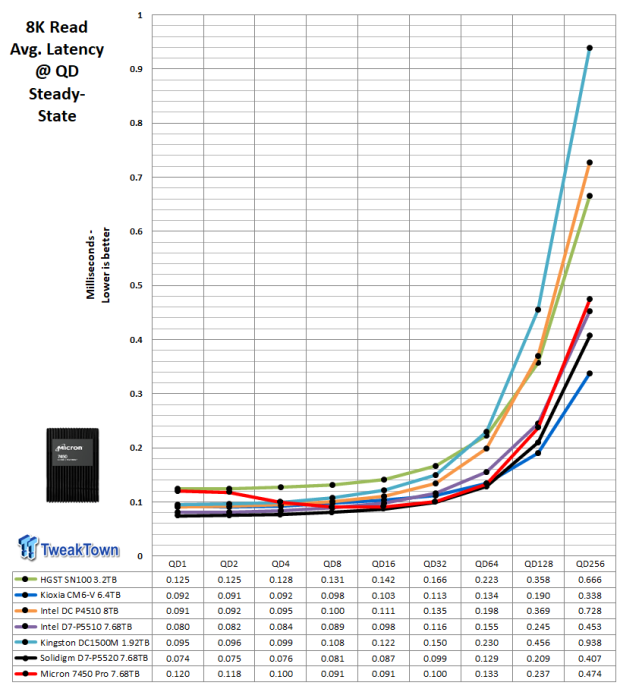
As expected, the 7450 Pro 7.68TB again demonstrates its prowess when serving up a pure random read workload. We do note that the drive's optimal performance range is between QD16 and QD64, where it manages to again deliver the second-best results we've obtained to date.
128K Sequential Write/Read
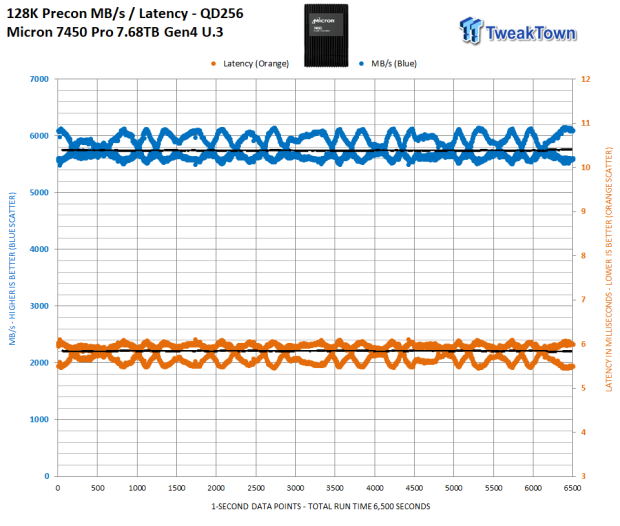
We precondition the drive for 6,500 seconds, receiving performance data every second. Steady-state for this test kicks in at 0 seconds. The average steady-state sequential write performance at QD256 is approximately 5,750 MB/s. Kind of an odd pattern we've never seen before. We don't take any issue with it, as there are no outliers, and the average is well above the stated up to 5,600 MB/s.
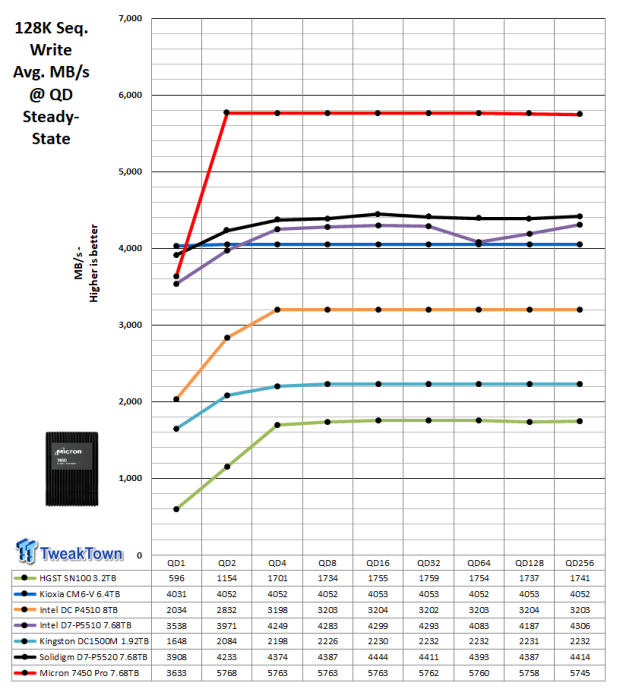
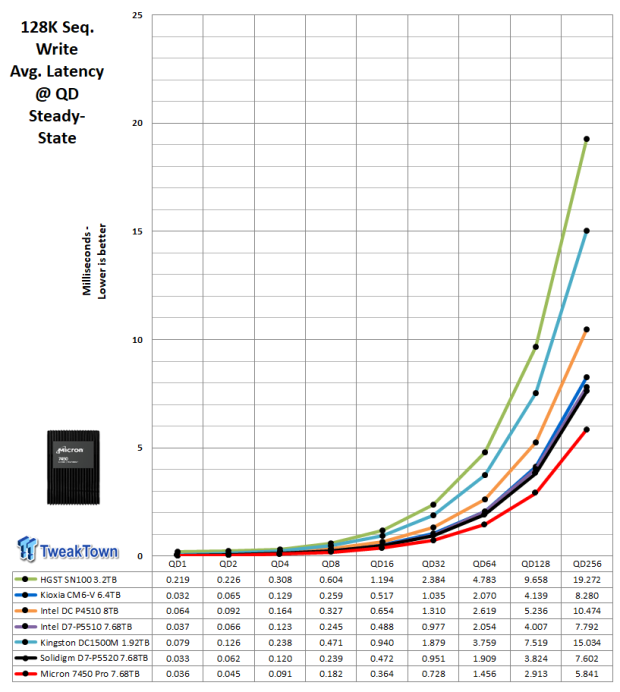
As high as they are, our testing indicates factory sequential write specifications are still on the conservative side. We are hitting 5,760 MB/s which is 160 MB/s higher than the factory specs. Excellent. We find the results here to be extraordinary, with the 7450 Pro serving up 30% more sequential write throughput than anything in its class. Outstanding.
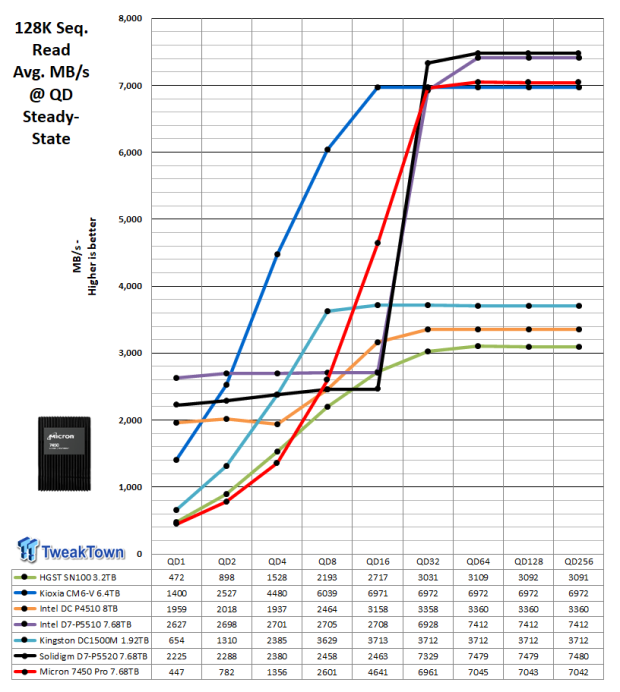
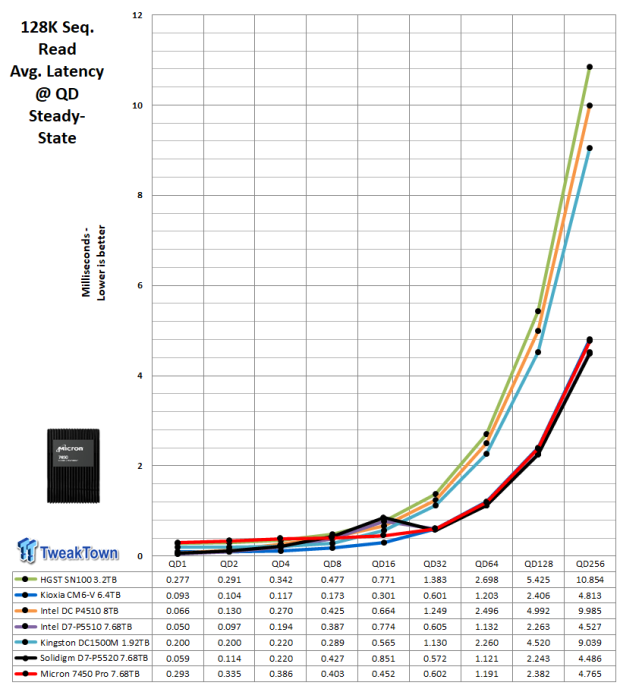
Our test subject can indeed deliver 7,000MB/s throughput, exactly as expected from a PCIe Gen4 SSD. However, we are a bit taken back by its unusually low sequential read throughput at low queue depths. All-in-all we see no cause for concern here, as pure sequential read workloads are uncommon at best.
Benchmarks - Server Workloads
Email Server
An Email Server workload is a demanding 8K test with a 50 percent R/W distribution. This application gives a good indication of how well a drive will perform in a write-heavy workload environment.
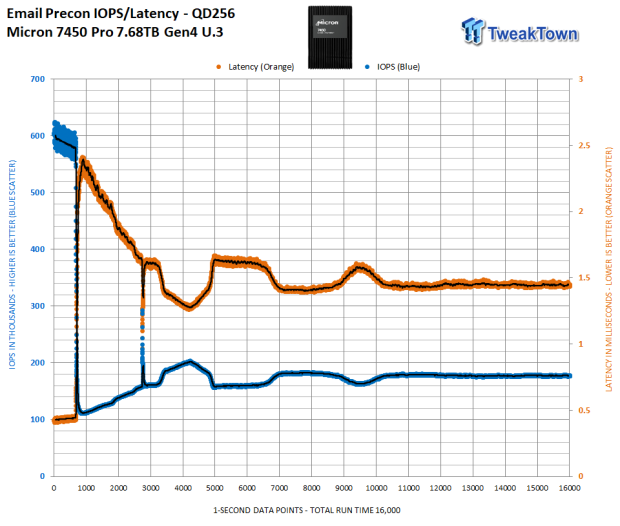
We precondition the drive for 16,000 seconds, receiving performance data every second. We plot this data to observe the test subject's descent into steady-state.
Steady-State is achieved at approximately 11,000 seconds of preconditioning. The average steady-state workload performance at QD256 is approximately 178K IOPS. Our data pattern indicates extremely good QoS, the best we've seen to date for a flash-based SSD.
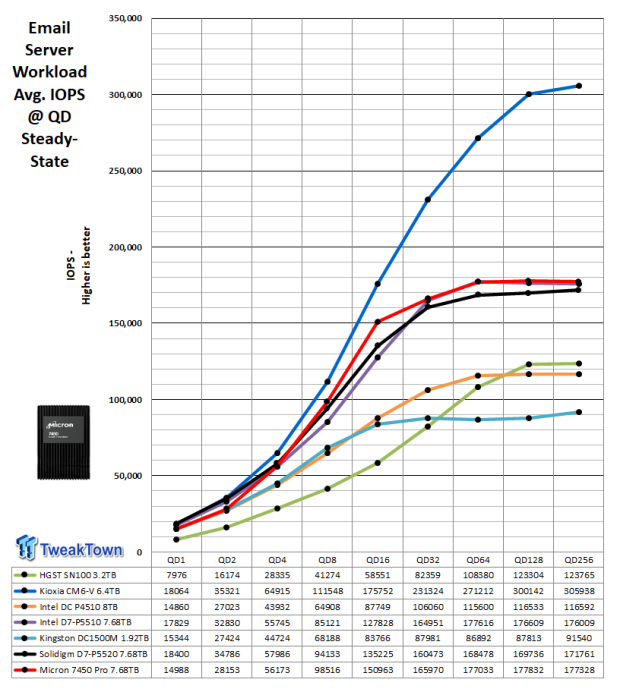
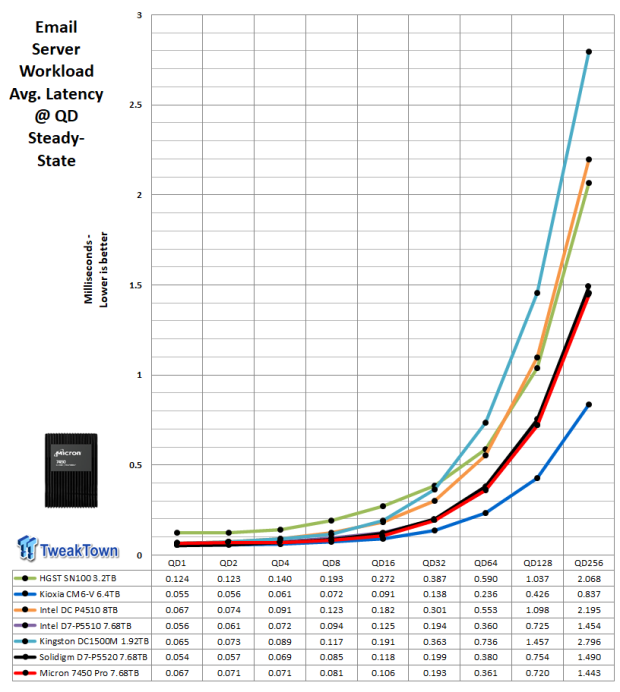
Across the board, we like what we are seeing. We do note that at queue depths of 8 and higher, our minimally overprovisioned test subject is yet again delivering class-leading performance. Impressive.
OLTP/Database Server
An On-Line Transaction Processing (OLTP) / Database workload is a demanding 8K test with a 66/33 percent R/W distribution. OLTP is online processing of financial transactions and high-frequency trading.
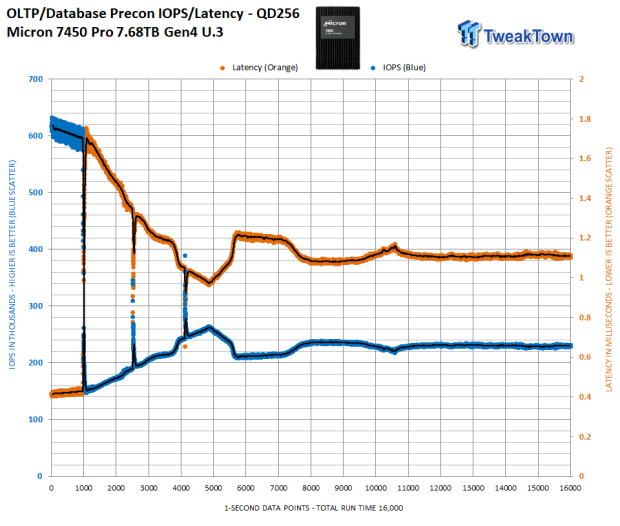
We precondition the drive for 16,000 seconds, receiving performance data every second. We plot this data to observe the test subject's descent into steady-state.
Steady-state is achieved at 12,000 seconds of preconditioning. The average steady-state workload performance at QD256 is roughly 228K IOPS. Again, the data pattern indicates extremely good QoS, the best we've seen to date for a flash-based SSD.
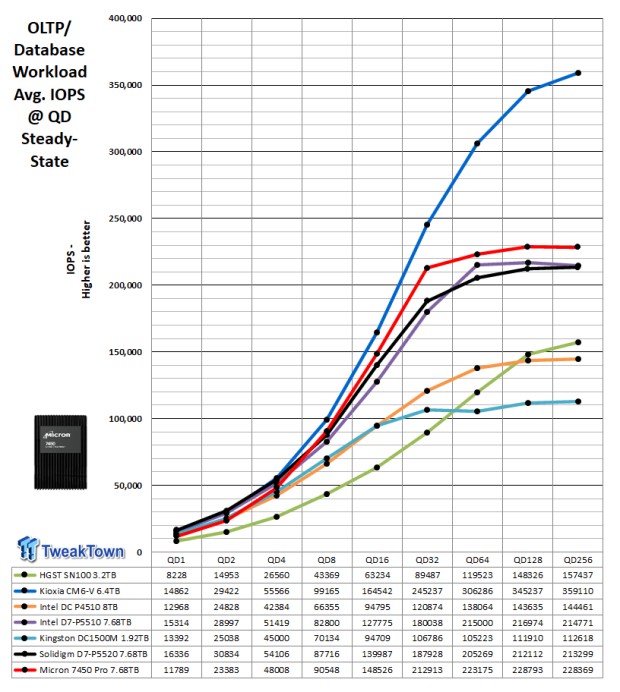
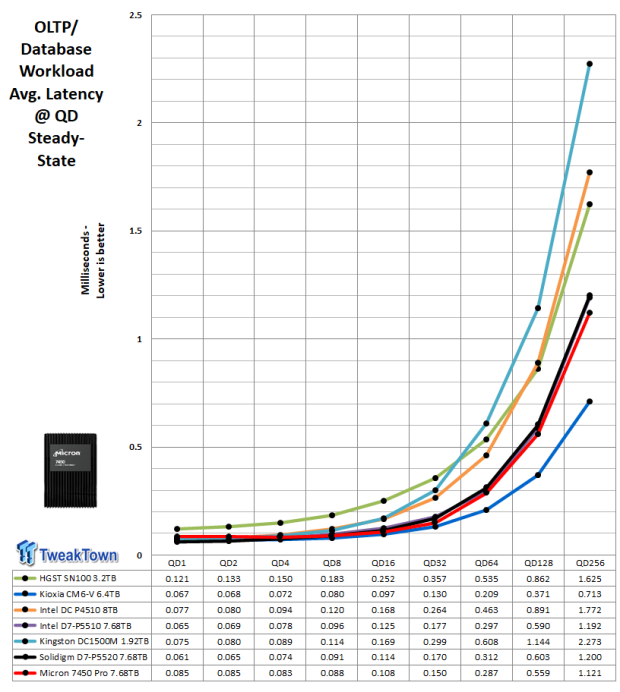
As we saw with an email server workload, the 7450 Pro is delivering best-in-class performance at queue depths of 8 or more. Micron specs our test subject as capable of delivering up to 415K IOPS with a 70/30 4K random workload. This test is very similar in terms of read/write distribution, being 66/33; however, ours is an 8K workload. Generally speaking, if we double our 8K results, it's roughly what results at 4K will be, indicating a result at a minimum of 456K IOPS, which is again class-leading.
Web Server
A Web Server workload is a pure random read test with a wide range of file sizes, ranging from 512B to 512KB at varying percentage rates per file size.
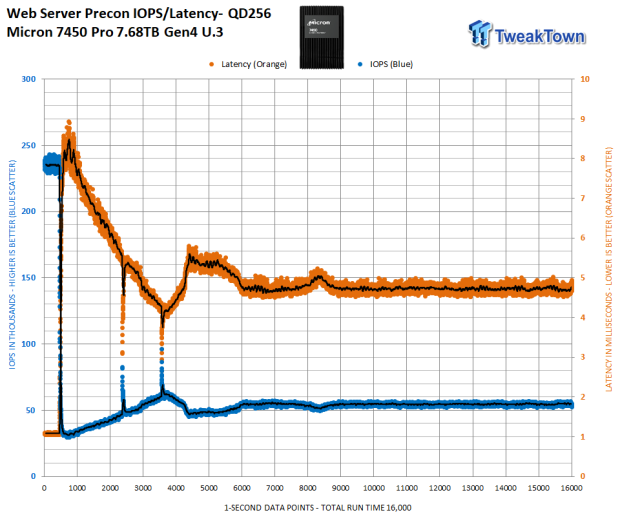
We precondition the drive for 16,000 seconds, receiving performance data every second. We plot this data to observe the test subject's descent into steady-state.
We precondition for this test with an inverted (all-write) workload, so no relevant information can be gleaned from this preconditioning.
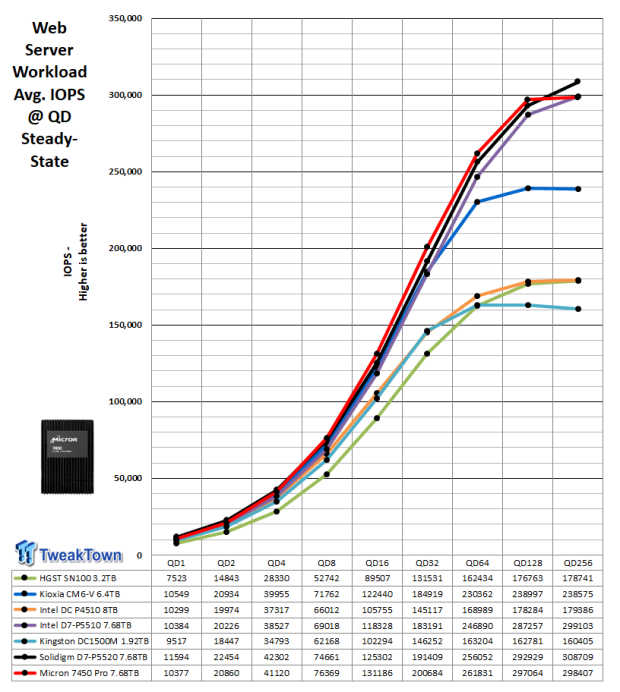
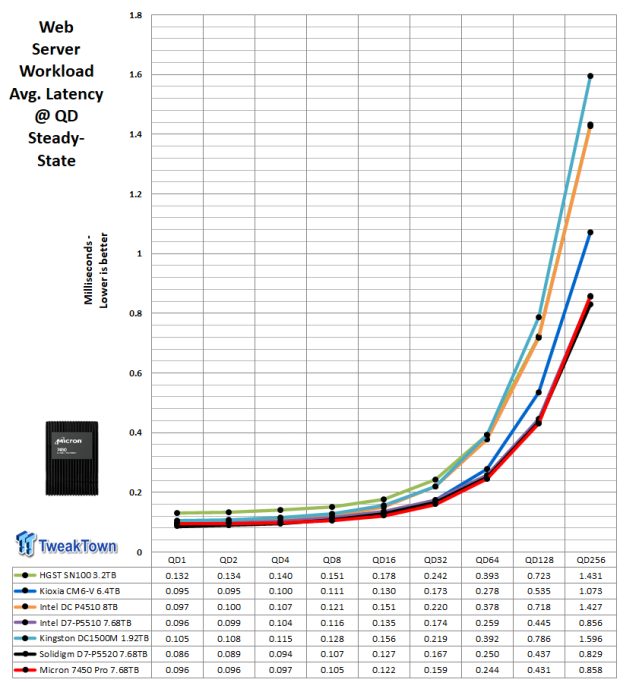
As impressive as everything else we've seen to this point is, we find this result to be the most impressive. This time, and again at queue depths of between 8 and 128, not only does our test subject deliver class-leading results, but it also manages to deliver a lab record for any flash-based SSD we've ever tested. This is performance that matters, because the majority of datacenter workloads are heavily weighted toward random reads.
Final Thoughts
We weren't exactly sure what to expect from a B47R arrayed enterprise SSD. We figured it would be good stuff based on what we've become familiar with in the consumer realm. Not great, but very good if it were to follow the path of its consumer brethren. Well, turns out that in an enterprise environment where QoS is paramount, B47R delivers better than anything we've tested to date.
As mentioned, the 7450 returned pre-con chart patterns so tight we for the first time ever had to rescale our scatter points just to see the colors hidden behind our trend line. Crazy good.
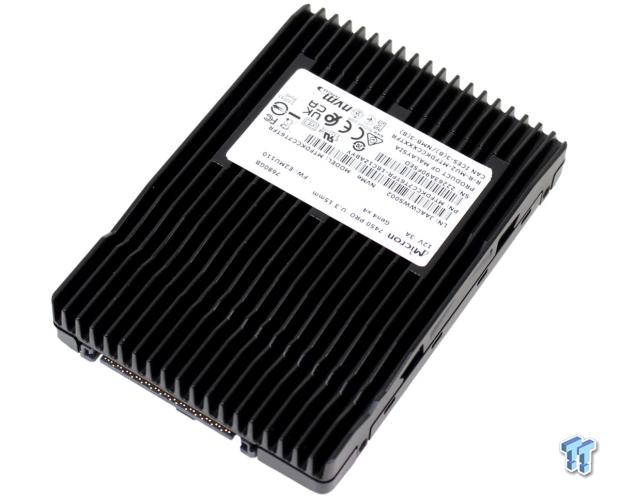
When we take everything into consideration, we have to conclude that overall, Micron's 7.68TB 7450 SSD is the best-performing flash-based SSD of its kind we've tested to date. Editor's Choice.

